
I’ve spoken publicly quite a few times about the influence of the Arabloggers network, an organic network that Sami Ben Gharbia turned into a semi-annual conference in the summer of 2008 in Beirut (at which all three above were present, though this picture is from Budapest that same summer) and repeated in Beirut 2009 and Tunis 2011. This photo, of Razan Ghazzawi (arrested yesterday), Alaa Abd El Fattah (arrested in October) and Ali Abdulemam (sentenced in absentia by the Bahraini authorities, and currently in hiding), is a testament to what a powerful network Arabloggers is, and what a threat regimes see it as.
I can’t believe I’d never seen the photo before. Thanks, @chanadbh.
5 replies on “Razan, Alaa, Ali.”
Dear brave bloggers,
I am so grateful for your courage, and hoping that you and all others who have been arbitrarily detained are released immediately. Your courage inspires us.
Here is an excerpt of the great intellectual achivements of the great thinker Ali Abdulemam… :-)
Taken from the website of this…”person” (abdulemam blogspot com).
“their price of fuck or been fucked, cause its one of their needs also so don’t sue me, more than two weeks, those who suppose to watch us cus we gave them our voices they didn’t give a shit about whats going on their, and those mother fuckers”
“indians, pakistanis or what ever mother fucker is working thier”
“he donesn’t need to bullshit us this kamal eldeen and say he will issue a good reports, while his money is paid by the royal family, how ever michel jackson, the one most of the religious doesn’t want us to hear him, and the jews doesn’t want as usual”
“its a big shame and a big shit for tamkeen”
Yeah his courage really inspires us.. ;-)
[…] Jillian C York posted this photo of El Fattah in Budapest, where he was attending an Arabloggers conference in 2008. Beside him are two other bloggers, Ali Abdulemam of Bahrain who was “sentenced in absentia by the Bahraini authorities, and [is] currently in hiding,” and Razan Ghazzawi, a US-born Syrian blogger who was arrested on December 4 on the border with Jordan, while en route to attend a conference on freedom of the press. On Monday, Ghazzawi was charged with seeking to incite sectarian strife as well as “spreading false information and weakening national sentiment.” According to the Guardian, rights activists say that the latter charge is often “levelled against those who challenge the regime.” Ghazzawi could be sentenced with up to 15 years in prison. […]
[…] Jillian C Yorkpublicado esta foto de El Fattah en Budapest, donde asistía a una conferencia Arabloggers en 2008. Junto a él están otros dos bloggers, Ali Abdulemam de Bahrein, que fue “condenado en rebeldía por las autoridades de Bahrein, y [es] actualmente en la clandestinidad”, y Razan Ghazzawi , un blogger sirio nacido en Estados Unidos que fue detenido el 04 de diciembre, en la frontera con Jordania, mientras se dirigía a asistir a una conferencia sobre la libertad de prensa. El lunes, Ghazzawi fue acusado de incitar al conflicto sectario , así como “difundir información falsa y debilitar el sentimiento nacional”. De acuerdo con el tutor , los activistas de derechos humanos dicen que la carga última es a menudo “, dirigida contra los que desafían al régimen”. Ghazzawi podría ser condenado hasta con 15 años de prisión. […]
[…] Looking at this brief summary of the past year, it is easy to understand why the UN High Commissioner of Human Rights, Navi Pillay, declared 2011 as the year where “human rights went viral.” However not all of year’s events treated human rights kindly. The execution of Muamar Gaddafi at the hands of rebel forces in Libya, and the cheers that came from some corners at the online footage of his abuse at the hands of his captors, reminded us that even monsters deserve compassion and we all have it in us to deny others basic dignity. In the US, the execution of Troy Davis brought the death penalty back into the spotlight, but even a sustained media campaign on the apparent shortcomings of the case against him could not save his life. The year was also not a good one for journalists, as the Committee to Protect Journalist announced that 45 journalists were killed in 2011, with Pakistan being the most dangerous country for journalists this year. And while some claimed 2011 to be the year of social media, that also came with tragic consequences as citizen journalists and online activists found themselves in the crosshairs of various groups, from drug cartels in Mexico to government forces in North Africa and the Middle East. […]